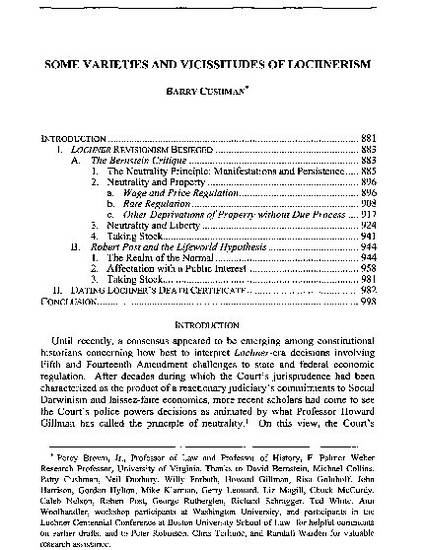
This article is a contribution to the Lochner Centennial Symposium at Boston University School of Law. Until recently, a consensus appeared to be emerging among constitutional historians concerning how best to interpret Lochner-era decisions involving Fifth and Fourteenth Amendment challenges to state and federal economic regulation. After decades during which the Court's jurisprudence had been characterized as the product of a reactionary judiciary's commitments to Social Darwinism and laissez-faire economics, more recent scholars had come to see the Court's police powers decisions as animated by what Professor Howard Gillman has called the principle of neutrality. On this view, the Court's jurisprudence is best understood as erecting a series of obstacles to "class," "special," "partial," or "unequal" legislation, "legislation that could not be regarded as public-regarding because it benefited certain interest groups or took from A to give to B." Recently, however, two articles have challenged this emerging consensus. Professor Robert Post and Professor David Bernstein each have contended that the salience of the principle of neutrality in Lochner-era jurisprudence has been considerably overestimated, and in fact does comparatively little to explain the Court's decisions. These commentators instead prefer to characterize the decisions as efforts to secure zones of individual liberty and autonomy constitutionally insulated from intrusive government supervision. In Part I of this essay, I examine the arguments of each and seek to discern what, if anything, might be salvaged of the consensus view in the face of their critiques. In Part II, I examine a series of lesser-known decisions of the New Deal era to help elucidate the multiplicity of positions that justices of the period took on questions of judicial enforcement of Fifth and Fourteenth Amendment limitations on economic regulation. This examination is designed in turn to help evaluate another widely shared view: that the Lochner era came to an end with the Supreme Court's decision in West Coast Hotel v. Parrish in the spring of 1937.
Available at: http://works.bepress.com/barry_cushman/7/
